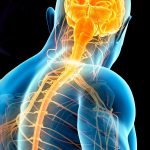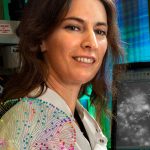Next Gen Delving into the best of both worlds with Shani Stern
As the only electrophysiologist in the lab, Stern uses her engineering expertise to delve into the biological mysteries that most intrigue her, particularly bipolar disorder.
Biology held no interest for her, at first.
As a high school student in Israel, Shani Stern was a math and physics whiz. She got her degree in electrical engineering from Tel Aviv University before starting her requisite service in the Israel Defense Forces where she made the rank of lieutenant.
Stern seemed contentedly destined to follow in the footsteps of her electrical engineer father, and worked as an electrical engineer for a few years for Intel and Motorola designing modem and speech algorithms for cellular phones. Then, she got married and had the first of her four children. Reading about birth and the various sicknesses children get, Stern suddenly became very interested in biology and wondered how the subject had escaped her interest before.
After receiving her PhD in physics from the Weizmann Institute in Israel and collaborating with its neuroscience department, Stern joined Rusty Gage’s lab at Salk in 2015 and became a member of the Engman Laboratory for Schizophrenia Research, where she enjoys the best of both worlds. As the only electrophysiologist in the lab, she uses her engineering expertise to delve into the biological mysteries that most intrigue her, particularly bipolar disorder.

With electrophysiology—a method invented in the 1970s that remains to this day the best way to measure the electrical currents through specific ion channels of cells—Stern studies the physiology and altered function of neurons derived from bipolar patients’ induced pluripotent stem cells. Using a pipette in which an electrode has been inserted, she is able to barely graze the surface of a cell, apply a minute amount of suction to create a seal so no currents can escape, then rupture the cell membrane to measure its currents and potentials. Stern’s expertise in this area makes her a hot commodity, and she is often enlisted by her lab mates to help record their research projects on such disorders as schizophrenia and autism.
This spring, Stern was the first author of a paper reporting the lab’s ability to accurately predict whether an individual with bipolar disorder will respond to lithium. One-third of patients diagnosed with bipolar disorder are effectively treated with lithium. However, it can take up to a year of treatment before seeing whether or not a patient is among the 70 percent who do not respond to the drug. The work, published in Molecular Psychiatry, reported predicting with over 90 percent accuracy whether an individual will respond to lithium, which could spare patients an ineffective treatment as well as help to better understand the disorder. She has already begun writing another major paper, this one on CA3 neurons in the hippocampus, whose ion channels in bipolar individuals exhibit marked differences from those in people who do not have the disorder.
Stern’s leisurely pursuits are anything but. She likes to unwind on weeknights by teaching advanced math to her children, who range from 4 to 15 years. On Sundays, the whole family heads outdoors to hike or visit an amusement park.
Despite the blistering pace she sets for herself, Stern wants at least one more paper on her resume before returning to Israel to start her own lab. “I haven’t learned enough,” she says. “I am still learning, and I am still having fun.”
Featured Stories
 Untangling the mysteries of the spinal cordConverging research and innovative technologies are tackling some of the deadliest motor diseases.
Untangling the mysteries of the spinal cordConverging research and innovative technologies are tackling some of the deadliest motor diseases. An interview with Diana HargreavesInside Salk talked with Hargreaves about why she prefers smaller intellectual environments, what excites her about the science she does at the Institute, and how she thinks about being a woman in science.
An interview with Diana HargreavesInside Salk talked with Hargreaves about why she prefers smaller intellectual environments, what excites her about the science she does at the Institute, and how she thinks about being a woman in science. Delving into the best of both worlds with Shani SternAs the only electrophysiologist in the lab, Stern uses her engineering expertise to delve into the biological mysteries that most intrigue her, particularly bipolar disorder.
Delving into the best of both worlds with Shani SternAs the only electrophysiologist in the lab, Stern uses her engineering expertise to delve into the biological mysteries that most intrigue her, particularly bipolar disorder.





















































